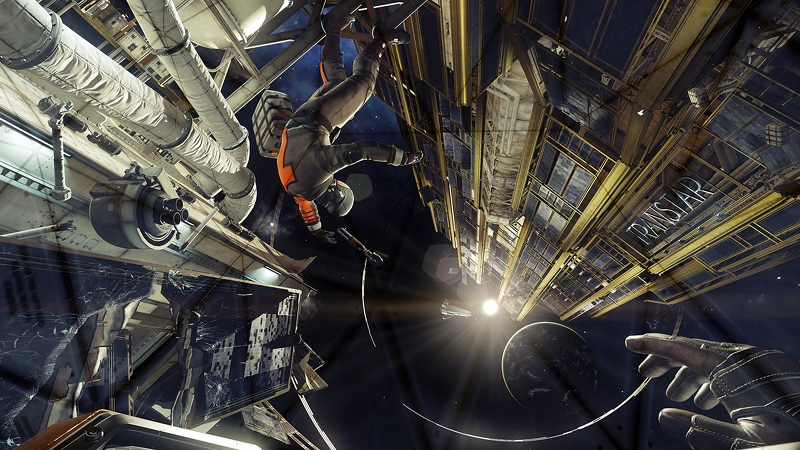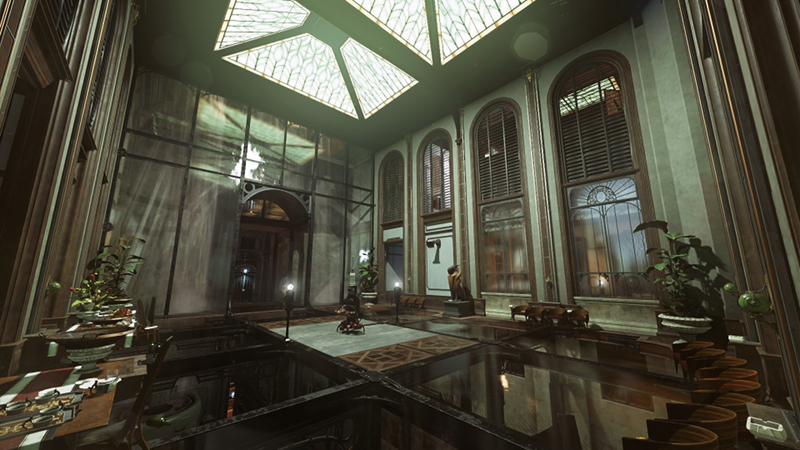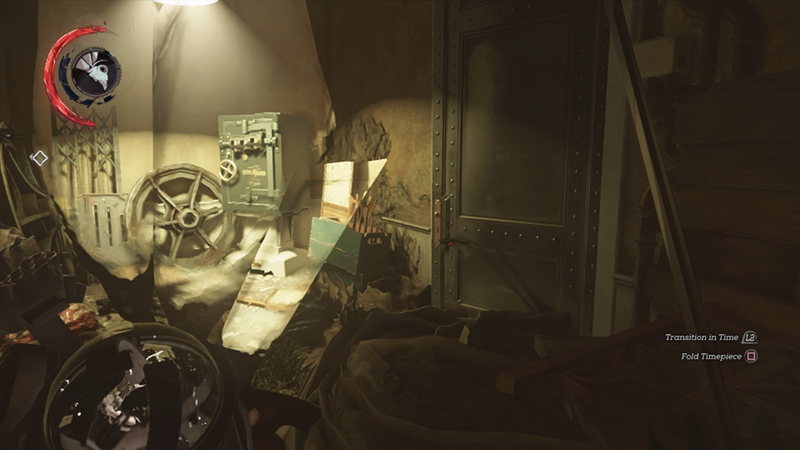Living Prisons Arkane Studios

Arkane Studios is better known as the developer of “immersive simulations” - worlds immersed in which - you are drowning; consisting of intricately intertwined systems tied to exotic abilities that can be manipulated to resolve the existing script in any number of ways. But it would be more accurate to describe the works of the studio, based in Lyon and Austin, as “immersive” simulators - setting the framework from which you struggle to break free using tools that are not entirely under the control of the designer.
Just look at how they usually start. Today, every Arkane title, with the exception of Dark Messiah of Might and Magic, a licensed spin-off, originates from the fact that the player’s character is imprisoned - from a dirty prison in the 2002 debut Arx Fatalis project to Emily’s sealed bedroom. Dishonored 2. This sets a certain tone, while Dishonored games give you the role of a freedom loving renegade, like a stray cage in the body of prudence, but their stories and sandboxes are tainted with the knowledge that even an unrestricted part of the design inevitably takes the form of a trap, edstavlyaya signals and a set of stimuli which is directed imperceptibly player or repel it.
 Arkane's highly rated, but poorly selling game called Arx Fatalis was presented as a sequel to Ultima Underworld, but the studio did not want to cede control of the game to the intended publisher Electonic Arts.
Arkane's highly rated, but poorly selling game called Arx Fatalis was presented as a sequel to Ultima Underworld, but the studio did not want to cede control of the game to the intended publisher Electonic Arts.
Danwall and Karnaki streets reward curiosity in various ways Call of Duty never had, but these paths are still a pile of integrated vectors and scenario solutions: illuminated windows that draw your attention; collectibles that lure you to the mouths of the alleys; villains whose various wiles are woven into the terrain that is waiting to be excavated up and down. The real task of such a game as Dishonored 2 is to call, which informs the developer about the mechanics and variables, which are used to detect certain tactics or access points that Arkane did not anticipate. This is clearly expressed in the legendary Mechanical Mansion, an interactive, tersely designed work in which your opponent is essentially an evil level designer who tracks your route through his crumbling, tunable laboratory, almost like publishers collecting telemetry of players' behavior until you turn on the necessary path and do not turn the stage equipment against him.
“I think everyone likes to see what is on the other side of the scenery,” says Rafael Kolantonio, co-founder and president of Arkane. “People like to go beyond, otherwise it looks like the usual“ oh yeah, I know what you want from me, game designer. ” You try not to break the game as long as possible - because playing it becomes unhappy, but breaking it as you wish, and eventually you get “oh, the game is still going on, but I do something (that is not planned by the game), I feel I’m special because I’m doing something that wasn’t part of the plans ”- I think this is a great feeling for the players.”
Of course, in many ways, the mechanical mansion is the greatest feat of universal deception - it sells you the fantasy of freeing and overthrowing the creator, which, nevertheless, is no more than an exquisitely set and controlled part of the design. Extremely disgusting, although he is a sociopath - Kirin Jindosh - this is nothing more than a comforting metaphor for a jumping puppeteer, distracting you from someone who is really pulling your strings. But if the gilded Arkane prisons are inviolable, they are enlivened by a radical sensation that is scarcely served by critical praise for “details” or simply by a considerable number of options supported by the script.
If games are learning mechanisms, then Arkane games teach you not to trust your teacher, to overthrow the structures supposedly created for help or entertainment. Also, the Dishonored series of games tell tales of abuse of political power, so their levels represent a severe test for activist tendencies that bring, to say the least, much more good. It's not just that they destroy the fourth wall, which they forcibly stuff into fiction for sophistication, or that they show you landscapes that contain much more ingenuity than in most other games - but that they reveal to themselves the means imprisonment, and incite you, by various soft tricks, to break your shackles. I may have gone too far, but if I wanted to teach courses about the institutions of oppression and the articulation of rebellion in popular culture, I would know what kind of video game I would bring to class.
 The Mechanical Mansion is probably the finest level in Dishonored 2, not least because of the understanding that there is an additional environment at the bottom of the slope to its door.
The Mechanical Mansion is probably the finest level in Dishonored 2, not least because of the understanding that there is an additional environment at the bottom of the slope to its door.
Designing them is costly and, as Liam Neeson would say, a very specific set of skills.
“They are hard to make,” says Kolantonio. “They have many invisible values, problems that people would not want to solve. All the possibilities are more about fixing a million problems than creating content. If you take a look at the efforts that are put into the right job when creating things, only if you don’t make a game of a different kind, then you don’t have to worry about questions like - what if the player does so? But what if the player does something else? ”
“Other games do not care about this, and they get away with it, so I think that this is one of the reasons why people don’t make these games so often, and secondly, I think it’s hard to sell. I do not think that other publishers, other than Bethesda, who really understand us, because she was successful in the field of similar games, are capable of such. I remember working with other publishers, and most of the publishers responded to the many values that are characteristic of immersive simulators in the spirit: “Why are you so worried about them? Why do you care? What is the value? How does she sell the game? ”, That's why they are so rare.”
And it’s not just people with big money who don’t see the point in immersive simulators. Team members may have some beliefs, even given their passion for Arkane’s previous work.
“You definitely need a special team,” says Kolantonio. “You need people who will trust you, because they often ask questions:“ why do we have to waste time on such things ”or“ are you sure that this is a good idea, ”but then, eventually, they understand.
“We did it during the development of each game - when we attract more people, some of them are really ready for such a game, but most are not. Therefore, we must tell them that they are going to do something that sometimes will have to be redone, and sometimes completely discarded. Some people agree, while others find a similar alignment of things too complex. And then, at a certain point, these people begin to understand what they were actually working on, and when the picture develops as a whole - they realize why we were doing this whole thing. ”
 Where the “Mechanical Mansion” seems to incite your mind against the level designers in real time, the “crack in the universe” turns one of the basic concepts of Dishonored - the practice of shaping the fate of any areas. Here the level is in its final state, and you are asked to rewrite it.
Where the “Mechanical Mansion” seems to incite your mind against the level designers in real time, the “crack in the universe” turns one of the basic concepts of Dishonored - the practice of shaping the fate of any areas. Here the level is in its final state, and you are asked to rewrite it.
An integral part of creating an Arkane game was the ability for a player to grow without balance, allowing them to deform the structure of the game around themselves - a good example is Blink's ability, which is a teleport for short distances, which was initially unlocked, but not the ubiquitous core ability. Also an integral part of the development of the game is knowing when to stop, knowing that the system or tool begins to overload everything else.
“I would say that in every game we had such problems,” comments Kolantonio. “I could go back to Dark Messiah in everything, putting ice puddles on the floor, and make people slip on them, which at first would be funny, but then it could create situations in which such a spectacle would look ridiculous. We've come across this all the time. ”
“Dishonored is quite suitable for an example, you can do a double jump in combination with a teleport, and perhaps in combination with the ability to jump even higher, you could overcome huge spaces. We didn’t actually set limits - well, to some extent, we limited the total impulse of the speed of movement, but we left it a high value, because we thought - “why not?” If someone finds a way to gain access to something that we have not planned, it will be great until such actions break the game. ”
Arkane introduced a new generation of the concept of an immersive simulator with the first Dishonored, as they say, surpassing domestic expectations with a considerable margin, although the sequel seems to have attracted fewer customers despite enthusiastic reviews. The developer also became more significant for the parent company ZeniMax, taking the Prey license after Zenimax and Bethesda publisher said goodbye to the original Human Head developer.
Rethinking Prey began in 2014 as a new IP, weakly inspired by the network of interconnected dungeons Arx Fatalis, it takes its effect in 2032, showing you traveling through a retro-futuristic space station flooded with various shapeless aliens, including fast “mimics” resembling headcrabs from the Half -Life, which can take the form of inanimate objects. This is a significant twist, because it returns Arkane's inclination to a luxurious, evocative, cozy interior that conflicts with its unstable form — this 60th-century artificial lampshade that you learn may easily turn out to be a mimic waiting for a wrap. your legs around your head.
 Gypsum cannon in Prey turns attacking opponents into stone, but can also be used to create platforms and block dangerous areas. Undoubtedly, for this gun there are many unexplored applications.
Gypsum cannon in Prey turns attacking opponents into stone, but can also be used to create platforms and block dangerous areas. Undoubtedly, for this gun there are many unexplored applications.
“We do not decide what subject they turn to, except at the very beginning of the game, because we wanted to introduce the players to the mechanics,” notes Kolantonio. “But at some point (in each area), there is an object that can Whether to be a mimic, and if a mimic fights with you and runs around the corner, he has a chance to turn into something. Therefore, if I play and you play in the same area, then the mimic cannot every time turn into the same object. ”
“We created several moments to deceive a player - for example, we put two identical objects somewhere so that the player could think:“ aha, there are two trash cans, it means one of them is a mimic ”. We did some of these things, but most of the time we just leave them to the mercy of the simulation, and let the game do its job. ”
However, Arkane does not stop at this - over time, the player will also receive the ability to transform into objects (supernatural and funny little things), the power of which, as in the case of Blink combinations, deal a strong blow to the rest of the game.
“For us, it was more like a nightmare, because if you are too small, you can fit into the spaces, to possible places of passage, to which we do not want to give access. Thus, we have an adjustment that determines how small an object can be penetrated by a player, and on the contrary, how large an object should be that we can allow, and we have come up with some rules that are felt consistent and fair. ”
I checked the Prey build demo shortly after talking to Kolantonio, and was immediately caught up in the emotions, not least because of the conflicting hints the developer had about his previous work and playing style that he had kept. In one of the emails you will find a reference to Looking Glass Studios, the company behind the creation of the first Ultima and Thief, the cornerstones of the immersive sim genre, which had a huge impact on Kolantonio and Arkane co-owner Harvey Smith, before they started working together.
I think sending is more than just a joke. In the in-game mail, the message chain concerns only that part of the station, which is essentially a trip to the theme park of glory, positioning the Arkane heritage within the fiction of the new game, which is rather difficult to read, but I remind you that no matter how generous the simulation is, in the shower this is another "Mechanical Mansion".
There is also a wrench, named after Hephaestus - the Greek god of artisans and craftsmanship - a rather ironic association for a tool that serves you rather as a beating tool. In general, as with the worlds of Arkane, there is a clever provocation; the assumption that you are capable of doing much more with what is given to you immediately catches the eye. Of course, provided that you are fine with your imagination, but more importantly, if you really want to be free.
')
Source: https://habr.com/ru/post/370443/
All Articles